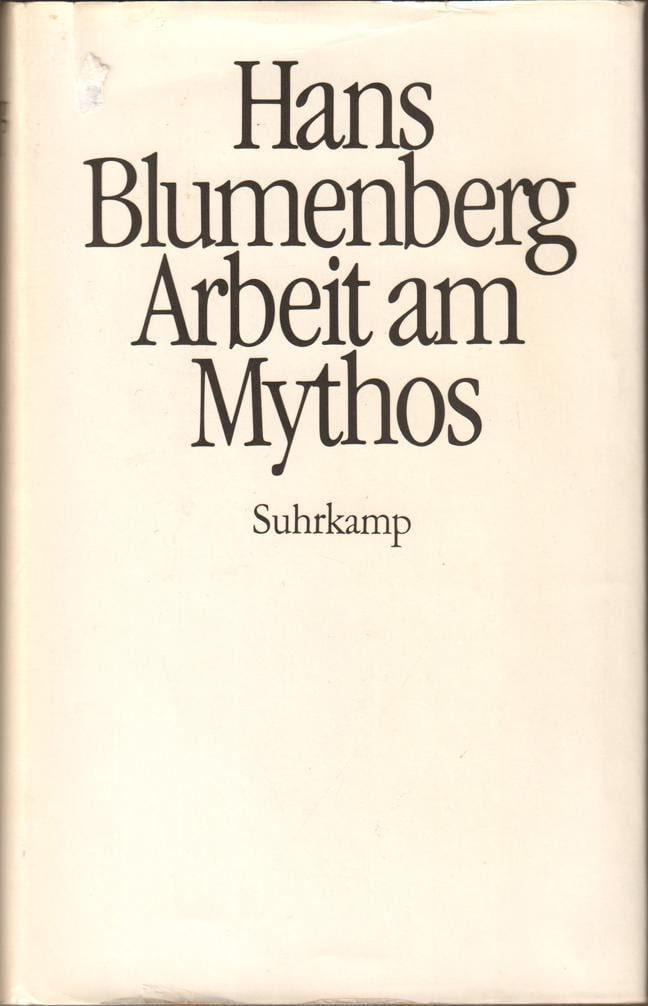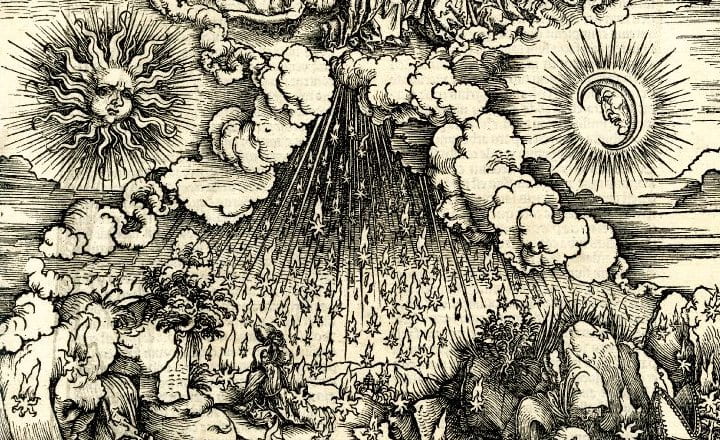By Williem Styfhals
Stories, narratives, and myths give meaning to our reality. Thinkers as diverse as Ernst Cassirer, Paul Ricoeur, Roland Barthes, and Hans Blumenberg knew that this is just as true in our supposedly modern world as it was in ancient societies. Today, this function of myth is often fulfilled by history. We study and retell the past because we believe it gives meaning to the present and the future. If the story of our collective past can tell us who we have been, we can rely on this image to make sense of our present community and give shape to its future. The founding myths or histories of cities are classic examples of such political storytelling. Looking back at our past, we can even read specific historical moments as announcing contemporary events. Political leaders often make use of this possibility, for better or worse, by presenting the past in such a way that it mythically justifies their powers or decisions. The German philosopher Hans Blumenberg tried to make sense of this political strategy through the concept of prefiguration. He coined this notion in a short text that remained unpublished during his lifetime but was recently discovered and published from his archives at the German Literary Archive in Marbach. A political decision that initially seems arbitrary can appear as legitimate and even necessary when it is connected to a similar decision or meaningful event from a nation’s history, Blumenberg claimed. The current decision is then prefigured—and therefore mythically legitimized—by a historical event of major importance that is not causally connected to the present but structurally resembles it. Blumenberg gives the example of the decision to declare war. If there are no strategic reasons for starting a war, the precise moment of declaring war is ultimately arbitrary. A leader might feel uneasy about this arbitrariness as it clashes starkly with the importance of his decision. In order to overcome this arbitrariness, leaders often appeal to previous, successful wars by choosing the same starting date. Thus connecting the present to the past, the current declaration of war seems mythically justified by history. One could easily imagine how similar prefigurative strategies are still used by politicians today.
Just as such narratives of collective history are often invoked in political decision-making, personal histories also inform our individual choices. Prefiguration certainly functions in existential contexts as well. There is indeed a basic human need to find meaning in choices that are ultimately contingent. Connecting present events and decisions to episodes in our personal and political histories can often alleviate this contingency. Making up such narratives and such historical connections is therefore intrinsic to human existence, Blumenberg would claim. Usually, we know that these personal stories as well as political myths are fictional and not entirely realistic. While this does not make them any less meaningful, this ambiguous relation to reality is not innocent. However vital stories, narratives, and myths are in giving shape to our personal and political reality, they also risk dismissing this reality itself in their pursuit of absolute significance. Especially in politics, the creation of a fictional reality is fraught with danger. The possibilities of constructing meaningful narratives from collective histories are indeed not infinite. At a certain point, stories and myths start misrepresenting or even abusing history. It is, therefore, important to determine when exactly myth becomes illusion. Today, in a time that has often been labelled a post-truth era, it is important to be able to distinguish meaningful stories from plain lies. Neither stories nor lies are strictly concerned with the truth, but stories give meaning to our world whereas lies ignore the world altogether. This is an important insight for contemporary politics, in which stories and narratives play a central role in shaping our political identity, but where they are also highly susceptible to a complete disregard for truth, reality, and history.

In my view, these are the philosophical issues Blumenberg was struggling with when trying to come to terms with the political myths of totalitarianism in his context of Cold War West Germany. As one of the most important twentieth-century theorists of myth, Blumenberg attached great value to myths, stories, metaphors, and anecdotes. Importantly, he did not consider such narrative elements to be at all irrational. Myth is neither lie nor illusion. On the contrary, it is deeply rational and indeed an ineradicable feature of all thinking. In his most famous book, Work on Myth (1979) he even claimed that “myth itself is a piece of high-carat ‘work of logos’” (p. 12). Given this positive evaluation of myth, Blumenberg could not simply dismiss the mythical elements of Nazi propaganda as irrational and illusory. This might be one of the reasons why he published little on the topic. However, some relevant texts have recently been discovered in Blumenberg’s Nachlass, among which Prefiguration is the most significant. It would be impossible to derive a coherent theory of political myth from these writings, but they do give insight into the specific logic of political myth. Blumenberg may help us understand the perversion of myth into delusion and explain how its positive and meaning-giving function becomes a destructive force.
Blumenberg always maintained that myth appeals to a human need for significance (Bedeutsamkeit). As the world is in itself indifferent to human meaning, we need stories that connect contingent events to make sense of the reality we live in. An absolute reality without such stories would simply be unbearable. This also holds true for political realities. Peoples and political identities are not simply given, but are the product of the stories and myths that are told about them. A world that is not mediated by such political storytelling is one where individuals are absolutely indifferent to each other’s existence and where community is inconceivable. Blumenberg often referred, in this respect, to Hobbes’ state of nature, in which “man is wolf to man.” A politics without stories about identities and communities would be impossible, in Blumenberg’s view. However, the danger of these political myths is that they easily go too far in their quest for meaning. In order to establish a community, to create a people, to justify one’s own power, to make an important political decision, etc., politicians have not simply used narrative strategies but have often been tempted to frame such myths as absolute stories about world history. Totalitarian political myths, in particular, interpret every important event in world history as prefiguring the fate of their nation. Political myths thus generate too much significance, to the point where they lose touch with reality rather than giving meaning to it. Political myth creates what Blumenberg called a “counterworld of realism” (Gegenwelt des Realismus). For him, this marks the point where myth turns into magic, where stories become lies.
The dangers of politicizing myth are most tangible in the myths of political apocalypse, in which the fate of the world is presented as being in the hands of a single nation or even one political leader. Much has already been written about the redemptive, millenarian, and messianic dimensions of totalitarian politics by theorists such as Eric Voegelin, Norman Cohn, and Jacob Talmon. Unlike these thinkers, Blumenberg’s analysis was not concerned with political myths that promise earthly salvation and secular utopia, but rather with those that prophesy the catastrophic end of the world. Such apocalyptic myths are omnipresent in contemporary politics too. The most obvious example is the Islamic State’s apocalyptic vision, but similar doomsday narratives are presupposed in debates about climate change, motivate doomsday preppers, and return in catastrophist populist rhetoric. Blumenberg himself wrote specifically about Hitler’s apocalyptic delusions at the end of the Second World War. His analysis centers on a claim Hitler allegedly made in his Berlin bunker a few days before his death: “Wir Kapitulieren nicht, niemals. Wir können untergehen. Aber wir werden eine Welt mitnehmen.”(“We will not capitulate, never. We can go down. But we will take a world with us.”). In Hitler’s vision, the end of the Third Reich and his own death would have to mean the end of the world itself. Such a vision would be mythical for Blumenberg—indeed to the point of being magical and delusional—because Hitler created a narrative about world history to give absolute significance to something as contingent as the end of a reign or an individual’s death. By presenting his own fate as cosmic fate, his death acquires absolute meaning. Because he could not deal with the fact that the world would remain indifferent to his downfall, he created a mythical counterworld in which reality itself would go down with him. When the project of myth is pursued in such an absolute sense, it almost automatically leads to apocalyptic myths that no longer attribute significance to an indifferent world but simply give up on this world altogether. This is why Blumenberg claimed in his book Lebenszeit und Weltzeit (1986) that “Hitler had no world.” The myths of political apocalypse thus obliterate myth’s most basic function of giving meaning to the world.

This question of the world also returns in another piece on Blumenberg I wrote for this January’s issue of the Journal of the History of Ideas. Discussing the central role of theodicy in Blumenberg’s thinking about modernity, I tried to show how myth actually functions as a theodicy, that is, as a justification of the world and its meaning. Such a mythical justifications seemed particularly necessary after the end of the Second World War when the legitimacy of the world itself was challenged by the horrible events that had taken place. Not just Hitler had given up on the world but many of his victims had too. For how could they still find meaning, let alone justify a world that had produced the Holocaust? In Blumenberg’s view, a reality devoid of significance is simply inconceivable, so it was of vital importance to find new ways to give meaning to the world through new political myths. The idea of a modest German democracy might have provided such a myth, but the primary example Blumenberg alluded to is Zionism, which he considered to be inherently mythical and thus essential for giving shape to Jewish identity after the Second World War. He even fiercely criticized Hannah Arendt for busting this myth in her analysis of Adolf Eichmann. In other words, an important lesson we can draw from Blumenberg’s writings on myth is that the dangerous political myths of our own times as well as those of the past can only be countered by inventing new myths, telling better stories, and writing more convincing histories.
Willem Styfhals is a postdoctoral fellow of the Research Foundation Flanders (FWO) at the Institute of Philosophy, KU Leuven, Belgium. He is the author of No Spiritual Investment in the World:Gnosticism and Postwar German Philosophy (Cornell, 2019).




Leave a Reply